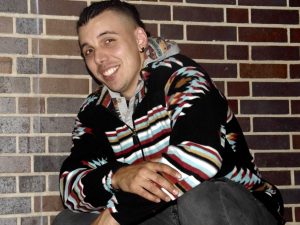Here is a map showing the demographic of the residents of Ottawa who speak an aboriginal language, according to Statistics Canada's 2011 National Household Survey dataset. Considered to be a breakout in Canada’s hip hop scene, 24 years old Indigenous artist Cody Coyote is one of Ottawa's arboriginal language speakers. Here is his story.

“Guess what saved me? My culture.”
24 years old Ojibwa artist Cody Coyote had to persevere through a lot growing up as an Indigenous youth in Ottawa. From drugs and gangs to abuse and domestic violence, it all started when his family moved to Orleans.
“We found new challenges that didn’t exists to us as young kids, he says speaking about him and his siblings. You run around the playground and it doesn’t matter which colour or nationalities you are: you love everyone.”
Going from a multi-nationalities neighbourhood to a more Cauacasian one, he says racial discrimination started during the first days at school. He recalls other children making fun of his long hair, calling him a stupid Indian, a bison rider, or even mocking him by doing the hand over the mouth gesture, typical behaviour of Hollywood movies on Indians and cowboys.
“There are times I could take it and there are times I simply couldn’t take it, and that is what moulded me and shaped me into who I am today.”

That’s when the pen and the notepad came along. Lyricism about his day-to-day activities and about deeper personal and intergenerational wounds, he started writing poetry, which quickly turned into songs, albums and concerts.
Music helped him in lonelier and darker times, but seeking help through centres for Aboriginals in Ottawa also changed the course of his life, according to him. With culture nights, gym hours, lunches, mother-daughters bounding activities and a number of other weekly events, there are a number of Indigenous children, teenagers and adults seeking help and stability through those centres.
“The Odawa centre gives them a safe place to be where they can understand one another. A lot of them go through similar struggles”, says Julianna Mayes, administrative support worker at the Odawa Native Friendship Centre.

Having now moved to the Riverside neighbourhood of Ottawa, Cody Coyote says he spends time at the centre every day after work. “I like to see youth in that environment because it keeps them away from drugs, parties, and alcohol, and it shows them how beautiful life can be when you have a healthy lifestyle and a healthy surrounding”, he says.
Finding more about his culture meant finding more about himself, ultimately better understanding the discrimination and struggles he and other Indigenous have been going though for years.
“There are myself and other Indigenous leaders who are eager to learn, they are hungry. I was myself deprive of this (his culture) when I was young. Now, I want to know. I want to know where I come from. I want to know my language, because all of this gives me some closure for a lot of unanswered questions and frustrations that I have.”
While attending an event organized by different centres in Ottawa, he recently learned how to make a tepee, side by side with his father who was also learning for the first time.

Adopted by a family in Ottawa at a young age, his father’s birth certificate indicates that their ancestors are from Matachewan First Nations. Him, his father and his brother have just returned from a trip to the reserve.
“We are now just finding out who are blood relatives are. My dad will be finding out who is biological mom and dad are, so I will be able to know what clan I come from, which we are all really thankful for because the clans pass down from a generation to another,” he says.

After sorting alcohols and drugs related problems, turning his life experiences into music earned him two nominations for Best Rap/Hip Hop CD and Single Of The Year at the 2015 Indigenous Music Awards.
Since then, his music gained a lot of attention among Indigenous communities, not only in Ontario but also across the country. He performed in Montreal, Toronto, Ottawa, Winnipeg, Yukon and a number of other places.
His new song called Northern Lights will be released in a month and its video footage was filmed in the Yukon.
“The local people there were telling me that there is a good number of them that believe that when you look at those northern lights, you’re looking at your ancestors dancing in the sky, he says. The song is uplifting and it sends the message to the people there that despite any kind of situation, you can shine like a northern light, you can shine like your ancestors did.”
